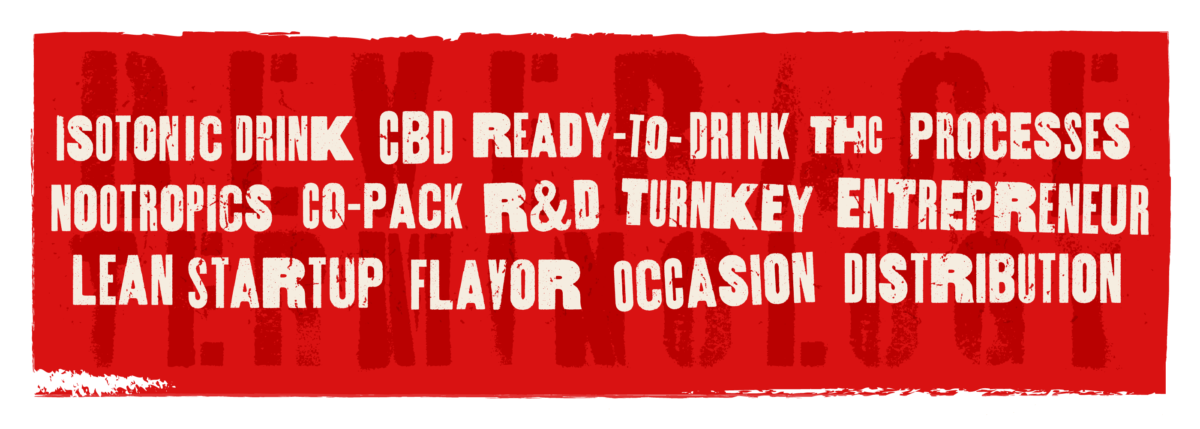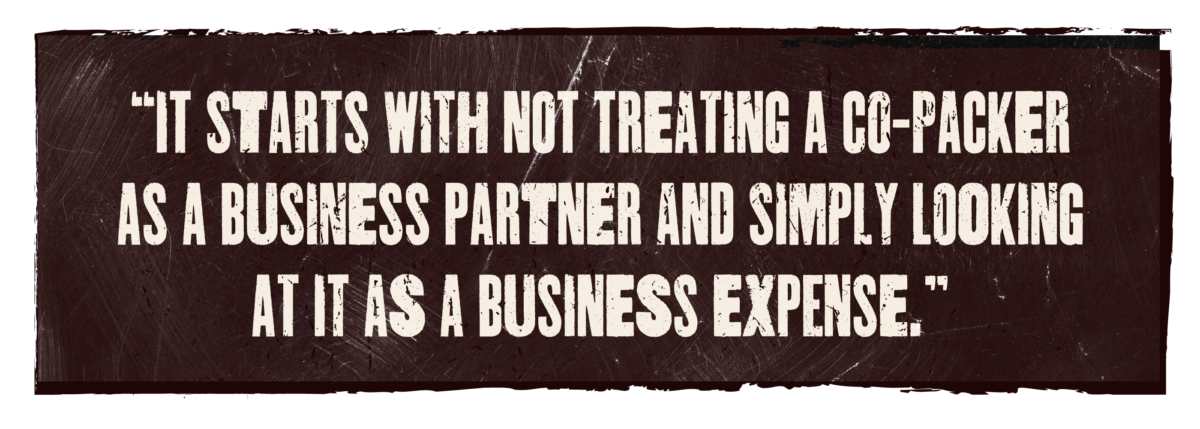Resources
Demystifying the Beverage Co-packing Process
How to find the right partner, develop a superb product and go-to-market leanly
CODO has worked with dozens of startup beverage companies who initially came to market via a co-packer. This is a great way to start lean vs. investing in your own production facility right off the bat (or for established companies who don’t have to capacity or capability to produce something themselves in-house).
We’ve heard directly from our clients that co-packing can seem like a black box. What will it cost? How long will it take? How do we handle licensing and distribution… We’ve had enough glimpses into this process ourselves that we thought it would be valuable to sit down with a leader in this space and talk shop.
Enter Mark Gallo: Sales Manager at Nor-Cal Beverage. Mark is a wealth of knowledge on all of this and will now walk us through each step of this process.


Oh, hi Mark. Please introduce yourself and tell us what you do at Nor-Cal Beverage.
 Mark
Mark
I’m Mark Gallo and I’m a beverage enthusiast. I have worked in beverage my entire career. Got started working for an Anheuser Busch wholesaler in college and after graduating, I worked shy of 11 years in field marketing and sales for the brewery directly. I then had a short stint at Heineken. For the past 3 years, I have worked at Nor-Cal Beverage Co, a 3rd generation family owned copacker as self-described “Beverage Orchestrator” on the contract manufacturing business development team.

What does Nor-Cal specialize in?
 Mark
Mark
Nor-Cal is a large scale copacker producing close to 80 million cases of teas, lemonades, juices, isotonic drinks (sports beverages), sparkling waters and energy drinks. We operate out of 2 facilities–1 in West Sacramento and 1 in Anaheim. Amongst both locations, we operate 10+ lines.
In addition to production, we offer storage services (ambient, refrigerated and frozen) for raw materials, ingredients and finished goods. Our focus has been to build long term meaningful relationships with our partners and reduce customer turn.

I’ve been excited about this conversation for a while. We work with a lot of startups who are getting into the beverage industry for the first time. And the contract brewing / co-packing component of this process can seem like a black box. So I’d like for you to demystify this process for any new entrepreneurs out there.
Let’s set the scene—I’ve got an exciting new CBD-infused sparkling water (or canned RTD, kombucha, energy drink… etc.) and I approach you to discuss bringing this to market. What am I in for here? What are my next several steps in this process?
 Mark
Mark
Any and all inquiries from a brand to co-pack their beverage should be viewed as an honor. Someone is trusting you to bottle their passion and dreams.
The 1st step would be to engage in meaningful dialogue. Here a brand should uncover if the co-packer has appropriate equipment, skilled employees, market reputation, appropriate licenses/certifications. In addition, the brand should be willing to share with a co-packer the following: Processing type, Packaging specs, mixing instructions, samples.
From here if a match is made, we would recommend an onsite visit of the facility that would be making your beverage. At this point, pricing and contract terms should be reviewed.
Last step before full scale commercialization would be to organize a small trial run.
Tip: 6 things to look for in a co-packer = Credibility, flexibility, reputation, responsiveness, processes, routines

Is there a difference between co-packing and contract manufacturing, or is this a semantic issue?
 Mark
Mark
In my opinion the difference is semantic, similar to how distributor and wholesaler terms are used. The real difference is whether one is a toller vs. turnkey.
A toller has a business model where, brands are essentially “renting” line time and access to one’s quality department. A toller would not be willing to source ingredients, materials nor help develop a formula. Pack fees tend to be lower vs. turnkey.
A turnkey operation has a rolodex of services they offer a brand. They might be willing to source ingredients, materials, offer R&D services, etc. Pack fees tend to be higher here as well.


Build a stronger brand.
Sell more beer.
Join 7,500+ other beer industry folks and sign up for our monthly Beer Branding Trends Newsletter.

Beer Branding Trends 2.0

I’m sure this changes depending on the project scope and product itself, but how much time should people expect this process to take? Let’s say beverage formulation itself all the way through finished precut, packaged and ready to distribute?
 Mark
Mark
In talking with beverage entrepreneurs, we have not heard of a project getting off the ground sooner than 8 months. Most common response is around 14 months.
More and more resources are becoming available to help these entrepreneurs take on the challenges themselves or outsource certain aspects.
Another major benefit is how open/transparent young brands are about building in public. They gladly share their journey across all the social channels. Join some communities & post away on LinkedIn, Twitter, Reddit and Instagram.
Resources to check out: Fata & Fleishman / BevSource / Rodeo CPG

If someone brings you a recipe, are you able to use that as is or do you have to reformulate it and scale it up to work as scale?
 Mark
Mark
At most, co-packers would prefer to work with brands that have a commercial ready formula. Two resources that help brands achieve this are Flavor Houses and/or Process authorities. Along the way, co-packers are willing and able to accommodate formula changes to existing products.

What are a few common missteps you see beverage companies make as they head into a co-packing relationship? Can we save some people some money and heartache?
 Mark
Mark
It starts with not treating a co-packer as a business partner and simply looking at it as a business expense. The other big misstep is not having a contract outlining all agreed upon terms (length, price, volume, payment, downtime charges, audits, etc). Contracts protect both the co-packer and brand.

The industry has been talking about shortages and impending supply chain issues for the last 24 months, but it’s now becoming reality. Tell us how the supply chain disruption are affecting your and your client’s work every day?
 Mark
Mark
Supply chain disruptions affect all aspects of our business. Inbound and outbound shipments are delayed which puts immense pressure on warehousing space, which in turn could put production runs at jeopardy.
Delayed materials / ingredients have a ripple effect on production schedules, either pushing out or pulling up runs. One solution creates another problem somewhere in the organization.
Price increase have reached levels where they are no longer absorbable and passed on to the brands. The timelines of such notifications vary from overnight to 30 days’ notice.
Lastly, everyone is adjusting to longer lead times and allocations.

Do you have any idea when this might ease up?
 Mark
Mark
We anticipate supply chain easing up late 2022 or even early 2023. Demand planning and material availability will eventually catch up. New bottle/can manufacturing facilities will be coming online around then from American suppliers (Amcor, Ball, Crown, etc) along with overseas brand establishing factories in the U.S. (CanPak).


I enjoy talking with behind the scenes folks because, similar to a branding firm, you often have a good idea of what’s on deck 6 months to a year from now. (Because before the next big beverage trend hits the market, it has to first be branded and positioned, and it has to be produced).
So let’s go there. What are you seeing right now in terms of macro trends—what new beverages, or innovations on existing categories, are you seeing come through the doors at Nor-Cal?
 Mark
Mark
Macro trends we are seeing are young brands taking on legacy categories overlayed with an added layer of function:
Energy Drink – lower/more natural caffeine drinks
Sports Drinks – Alternative base liquid (coconut water, cherry, watermelon)
Soda – Pre/pro/post Biotics, adaptogens, nootropics
RTDs – Brands are being mindful of package sizes
My eyes are on the use of botanicals amongst alcoholic and non-alcoholic beverages.

Do you have any book / podcast / newsletter recommendations that beverage industry folks should check out?
 Mark
Mark
I continue to rotate amongst the following:
Newsletters: Snaxshot by Andrea Hernandez / Fingers by Dave Infante / Indie CPG
Podcasts: Honest Retail / Liquid Assets
All things BevNet / BrewBound
All things Beer Business Daily

What’s next for Nor-Cal? What are you excited about as we head into the middle of 2022 (and beyond)?
 Mark
Mark
NorCal is excited about the continued growth with our current customer base.
We have just installed one of the fastest P.E.T Hot Fill lines in the U.S. down in our Anaheim facility which will add another 12–14MM cases. In addition, our eyes are set on doubling our can tunnel pasteurization capacity in the near future along with diversifying into wine or spirits-based products. To date, we solely focused on non-alcoholic beverages.

Build a stronger brand.
Sell more beer.
Join 7,500+ other beer industry folks and sign up for our monthly Beer Branding Trends Newsletter.
